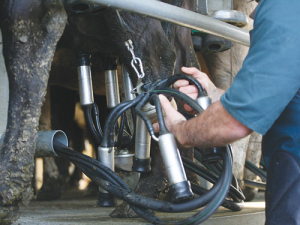Taranaki economy shifts from oil and gas to dairy as leading export
The Taranaki region is enjoying one of the highest gross domestic product (GDP) per capita figures in New Zealand, thanks to high farmgate dairy prices.
 The Labour Inspectorate says farmers can expect random visits to ensure they are meeting all of their employment obligations.
The Labour Inspectorate says farmers can expect random visits to ensure they are meeting all of their employment obligations.
A Taranaki dairy farm has been fined $87,000 for employment breaches in a case reflecting the Labour Inspectorate’s intolerance of negligent employers.
The Taranaki dairy farm will pay at least $87,000 for serious employment law breaches following a Labour Inspectorate investigation, including $64,000 in arrears and a $23,000 penalty issued by the Employment Relations Authority (ERA).
The farmer had not been paying his employees their minimum wage entitlements nor their correct public holiday pay.
The Labour Inspectorate told Rural News it is randomly visiting dairy farms across the country and all farmers should be prepared for a visit, says regional manager Natalie Gardiner.
However, she says, farmers who are compliant have nothing to worry about.
“The inspectorate has given farmers plenty of warning, and has worked with industry organisations to provide additional support,” Gardiner says.
“Farmers know their obligations, but they’re just not meeting them, which is extremely disappointing. All farmers must meet their obligations as employers.
“This is the law, and it is not an option to ignore it. If they do not meet their employment obligations, the inspectorate will not hesitate to fine them.”
In the Taranaki case, the ERA has directed that discussions between Allan Marx, of Vintage Farm Trust, and employees, continue. Marx accepts that he owes arrears because he had not paid minimum wages or public holiday pay. The issue was complicated by Marx not keeping records of employees’ hours or copies of employment agreements.
“It is unacceptable for employers to take advantage of employees by failing to meet basic legal requirements like paying the minimum wage or keeping proper records,” says Gardiner.
“This case perfectly illustrates the risk farmers take when they don’t keep sufficient employment records.
“Keeping records of the days and hours your employees work is a longstanding legal requirement in New Zealand which we expect every employer to meet; ignorance is not an excuse for breaking the law.”
The investigation was also marred by allegations of bullying: two employees were pressured into signing an agreement to settle their claims for $8500, well below the amount Marx later admitted they were entitled to.
Marx had not correctly paid his employees for working on public holidays, opting to give an extra $50 instead of their minimum entitlements.
The $64,000 in arrears paid so far have gone to the five employees working on the farm at the time of the inspectorate’s investigation, and to six former employees.
Get it right — Feds
Federated Farmers is urging farmers to correctly keep employee records and contracts.
Feds’ Taranaki provincial president Bronwyn Muir says it is essential farmers keep up-to-date contracts and wage and time records for all employees.
“Agriculture needs to attract a good quality, motivated workforce to drive productivity gains and to improve performance,” Muir says.
“So farmers need to provide workplaces which will attract those people.
“Getting the basics of employment law right is the foundation of an attractive work environment.”
Feds offers legally compliant contracts and employment agreements, available for members and non-members to buy.
“Legislation changes over time and it’s important to keep on top of changes and keep everything up-to-date,” Muir says. “We have contracts, templates and policies available.... It’s better to pay for advice and be compliant than pay a fine.
“We need to be compliant for the good of the industry and those who work in it.”
She says any farmer unsure whether their records and documents are compliant should get advice immediately.
Dairy Women's Network (DWN) has announced that Taranaki dairy farmer Nicola Bryant will join its Trust Board as an Associate Trustee.
Rural Women New Zealand (RWNZ) says it welcomes the release of a new report into pay equity.
Red meat exports to key quota markets enjoyed $1.4 billion in tariff savings in the 2024-25 financial year.
Remediation NZ (RNZ) has been fined more than $71,000 for discharging offensive odours described by neighbours as smelling like ‘faecal and pig effluent’ from its compositing site near Uruti in North Taranaki.
Two kiwifruit orchards in the Bay of Plenty and one in Northland are this year's finalists for the Ahuwhenua Trophy competition.
The Government's chief science advisor, Dr John Roche says the key objective for the science sector in the coming year is bedding down the reforms which sees the merger of the previous entities.

OPINION: A mate of yours truly reckons rural Manawatu families are the latest to suffer under what he calls the…
OPINION: If old Winston Peters thinks building trade relations with new nations, such as India, isn't a necessary investment in…